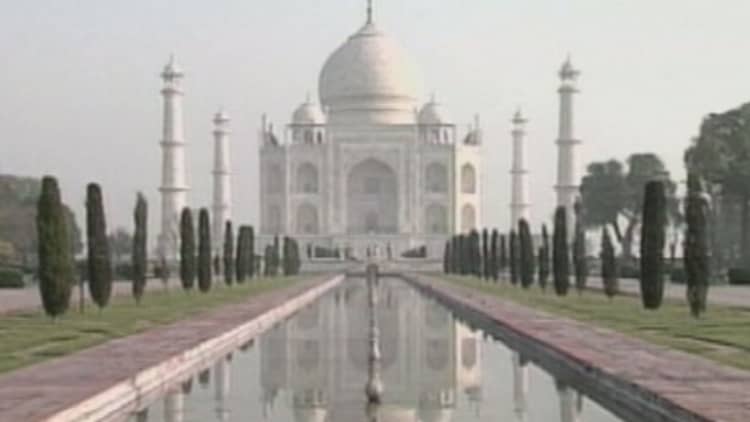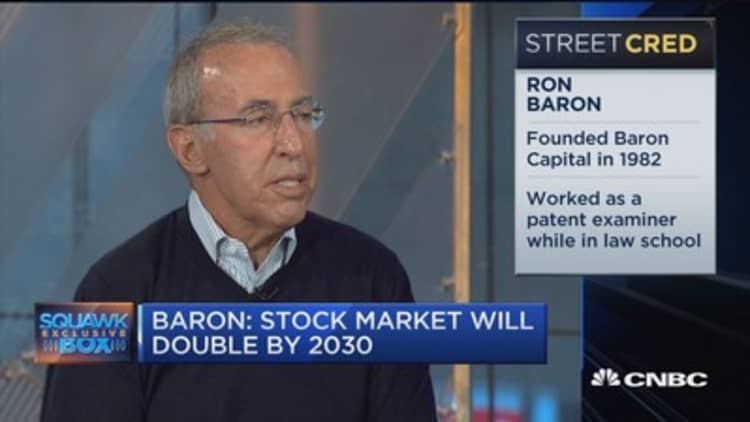
A tweet from Tesla Motors' CEO Elon Musk on Wednesday about setting up a Tesla factory in India may have taken some electric-car fanatics and Wall Street by surprise.
@elonmusk In discussions with the government of India requesting temporary relief on import penalties/restrictions until a local factory is built
But if a deal with India didn't seem like it was among the top items on Musk's mind, that's because many have missed a budding "Twitter EV bromance" between the Tesla founder and CEO and Indian auto executives and government officials.
On June 2, Anand Mahindra, the head of India's leading automaker Mahindra and Mahindra, invited Musk to come to India and be part of the country's budding electric-vehicles market.
Musk's response was short, noncommittal and guarded:
Unlike China, the other big emerging market, Musk has been blowing hot and cold for some time now on the question of Tesla's foray into the Indian market. In February one of Tesla's Indian fans took to Twitter to ask about the automaker's plans for the India launch.
Musk responded with a tease of summer plans.
@elonmusk Hoping for summer this year
But later in May, when another fan posed a similar question on Twitter, Musk backtracked, citing regulatory hurdles around local sourcing requirements.
@elonmusk Maybe I'm misinformed, but I was told that 30% of parts must be locally sourced and the supply doesn't yet exist in India to support that.
On the face of it, Tesla and India seem to be an ideal fit for each other. Both are committed to the cause of renewable energy and green mobility. Tesla is a sustainable energy company that is pushing for a world of zero-emission vehicles, and India is on course to become the world's third-largest auto market, tied to an ambitious vision to do away with fossil-fuel cars in favor of all-electric cars by 2030.
Despite the seemingly aligned interests, there are reasons underlying the Tesla founder and CEO's less-than-gung-ho tweets. Tesla and India aren't ready for each other just yet. It could take years for Tesla to debut in India.
Here comes the sticker shock
India is a highly price-sensitive market, which is a fact known globally. From to Uber and , many foreign companies have had to launch low-price versions of their products in a bid to make inroads in the Indian market.
Tesla's Model X, priced at roughly $90,000, and the Model S, carrying a $70,000 price estimate, are far out of the average Indian car buyer's budget. It would be hard for Tesla to achieve mass-market volume in India necessary for a venture to make good business sense for the luxury car maker.
"About 85 percent of the market is filled with value-conscious customers, [which] has the largest potential for growth," said Chetan Maini, the creator of Reva, India's first electric car. "Successful solutions designed so far have considered the price points they are willing to afford. Foreign or local electric cars (EVs) will grow in India only when there's price parity with its internal combustion engine (ICE) equivalent."
Even Tesla's upcoming Model 3 sedan — which starts at $35,000 and considered an affordable option in the United States — at 2.2 million rupees it is still a high-end luxury product by Indian standards, affordable only to a wafer-thin segment of India's car enthusiasts.
"India's mobility paradigm has very different characteristics as compared to that of Western counterparts," Maini said. He is also the vice chairman of SUN Mobility, a company that makes replaceable batteries for electric cars. "In the past, solutions tailored for the local conditions have worked well."
Morningstar analyst David Whiston wrote in a recent report that there's huge uncertainty as to whether Tesla will succeed in making great product at an affordable price. "There is evidence suggesting that Tesla will succeed, but if not, Tesla will remain an automaker for the wealthy," he wrote.
Emails sent to Tesla inquiring about the company's India plans went unanswered.
Lagging infrastructure
Adoption and expansion of electric vehicles in India will require an ecosystem to support their practicality, frugality and clean-energy objectives.
India's ambitious goals for green mobility — roads, charging stations, power storage, service centers and suppliers — contrast with the nation's inadequate infrastructure.
"The key challenges to adoption of EVs in India are low penetration of charging infrastructure," said Mahesh Babu, CEO, Mahindra Electric, the electric vehicle division of Mahindra and Mahindra. "Given these conditions, it is understandable that local as well as foreign players may hesitate to expand in the Indian market."
Several stakeholders have started discussions on developing an extensive EV ecosystem in India, but it may be a few years before a reliable infrastructure is in place. Babu said public-private partnerships are one way to speed things up. "Such partnerships will help in developing the market, both in terms of infrastructure as well as education and awareness," he said.
Sugato Sen, deputy director general at the Society of Indian Automobile Manufacturers, said an investment by Tesla in India could help boost EV infrastructure and adoption. "If we have companies like Tesla in the country, the infrastructure for charging vehicles and suppliers for EV components will come up faster," he said.
Tesla has invested billions in the U.S., China and Japan to set up networks of charging stations, and continues to pour capital into their expansion. Tesla won't reveal if it has similar plans for India.

India's pivot to green energy has paved the way for local companies to rush in with their EV offerings. Mahindra Electric is leading the charge with its homegrown, battery-operated e2o Plus, a $10,000 car that goes about 87 miles per charge. By comparison, Tesla's most affordable $35,000 Model 3 claims a range of 214 miles per charge. Mahindra makes up in affordability what it lacks in mileage, which it's trying to ramp up.
Local automakers are quick to point out the significant home-field advantage they enjoy relative to foreign carmakers.
"We have the unique position of having years of experience of the Indian market as well as over 265 million kms (164 million miles) driven on our EVs," Babu said. "This does put us at a certain advantage, and we have used these insights to develop our current and future products."
Maini said local players' in-depth understanding of local conditions creates advantages but ultimately can be co-opted. "Any foreign company can create a great business opportunity by understanding the local consumer behavior and market characteristics, and design a solution suitable for that country," he said.
A production plant in India may be a worthwhile investment for Tesla. "Tesla's mission is to make EVs increasingly more affordable, which means more assembly plants must come online to achieve annual unit delivery volume in the millions," Morningstar analyst Whiston wrote.
Musk did say at the recent Tesla annual shareholder meeting that he would like to build a new plant for the Model Y crossover vehicle. Though no details were given, the assumption for that is a U.S.-based facility. Musk has also said he plans to build multiple electric-battery gigafactories beyond the first gigafactory in Nevada.
We have the unique position of having years of experience of the Indian market as well as over 265 million kms (164 million miles) driven on our EVs.Mahesh BabuCEO, Mahindra Electric
India's commerce and industry ministry was quick to respond when Musk tweeted his concern about the 30 percent local sourcing requirements through the country's "Make in India" Twitter handle, and said that India's foreign direct investment (FDI) policy does not mandate any minimum sourcing of components by auto manufacturers.
@makeinindia With respect to news reports on launch plans of Tesla in India being delayed, please note some key clarifications
Further, India's minister for road transport and highways, Nitin Gadkari, is trying to woo Tesla by offering land near ports to set up a manufacturing unit in the country, according to local media reports.
More from Global Investing Hot Spots:
India will test Apple CEO Tim Cook's logistical genius
Vanguard's role in forcing a major climate concession from Exxon
Japan's first unicorn is an Amazon, Alibaba-like company
India's customs regulations and its graded tariff structure may serve as an imposing barrier for Tesla to overcome without manufacturing locally in India. Automakers are required to pay a hefty import duty, as much as 100 percent of the cost of the vehicle, to import cars.
Foreign-made cars worth up to $40,000 attract an import duty of 60 percent, and 100 percent if the value is greater. Sen said global auto manufacturers in the luxury market, like Porsche, Ferrari and Lamborghini, are playing by those rules to sell their cars in India.
"Doing trade [in India] is a tricky thing," Sen said. "If a company wants to just export vehicles through local dealers or distributors, they will only have to pay import duty," he said. "But if a company wants to enter India as a single-brand retailer, then they will have to source 30 percent of products locally within a certain number of years."
The only way around the roadblock is a local production facility. "All foreign EV makers should set up an assembly plant [in India] to get the benefit of bringing vehicles in completely knocked-down condition at 10 percent import duty," Sen said.
Tesla's timing of an India debut comes down to a choice between waiting for the electric vehicle movement in India to gain muscle and maturity or going all-in to get ahead of the game and capture the marketplace while helping it grow.
— By Vikram Barhat, special to CNBC.com




